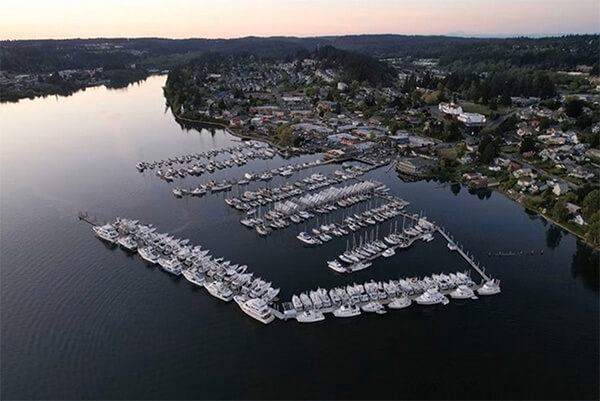By Tim Schermetzler of CSD Attorneys at Law P.S.
Summertime at the port means increased use of port facilities—port marinas, piers, and boat launches will be filled with recreational boaters, commercial fishers, and whale watchers; port parks will host festivals and events; and general aviation airports will see increased traffic. Unfortunately, this increased use can also come with conflict and rule violations by patrons of the port.
Common rule enforcement issues we hear from ports include difficulty enforcing rules for street parking regulations, prohibitions against swimming in marinas, and restrictions for overnight camping in port parks. This month’s column focuses on adopting and enforcing port rules.
Authority for Adoption of Rules
There are multiple sections in Chapter 53.08 RCW on port powers and Chapter 14.18 RCW on municipal airports empowering the commissions to adopt and enforce rules.
RCW 53.08.220(1) provides, in part:
A port district may formulate all needful regulations for the use by tenants, agents, servants, licensees, invitees, suppliers, passengers, customers, shippers, business visitors, and members of the general public of any properties or facilities owned or operated by it, and request the adoption, amendment, or repeal of such regulations as part of the ordinances of the city or town in which such properties or facilities are situated, or as part of the resolutions of the county, if such properties or facilities be situated outside any city or town.
For ports intending to regulate port streets, alleys, access roads, parking areas, or parks, RCW 53.08.230 provides:
A port district may at its option file with the county auditor a plat of any of its properties or facilities, showing thereon such private streets, alleys, access roads, parking areas, parks and other places as the port district may wish to have treated as public for purposes of motor vehicle or other police regulations. Such plat may be amended at any time by the filing of an amendatory plat, and may be vacated at any time by the filing of a resolution of vacation. So long as any such plat or amendatory plat is on file and not vacated, the motor vehicle or other police regulations of the state, and the motor vehicle regulations of the city, town or county, as the case may be, in which the areas described in the plat are situated, shall apply to such areas as though they were public streets, alleys, access roads, parking areas, parks or other places, and it shall be the duty of all state and local law enforcement officers to enforce such regulations accordingly.
For ports operating moorage facilities, RCW 53.08.320 provides, in part:
A moorage facility operator may adopt all rules necessary for rental and use of moorage facilities and for the expeditious collection of port charges. The rules may also establish procedures for the enforcement of these rules by port district, city, county, metropolitan park district or town personnel.
For ports operating general aviation airports, RCW 14.08.120(1)(b) provides, in part, that a port is authorized:
To adopt and amend all needed rules, regulations, and ordinances for the management, government, and use of any properties under its control, whether within or outside the territorial limits of the municipality; … to appoint airport guards or police, with full police powers; to fix by ordinance or resolution, as may be appropriate, penalties for the violation of the rules, regulations, and ordinances, and enforce those penalties in the same manner in which penalties prescribed by other rules, regulations, and ordinances of the municipality are enforced. For the purposes of such management and government and direction of public use, that part of all highways, roads, streets, avenues, boulevards, and territory that adjoins the limits of any airport or restricted landing area acquired or maintained under the provisions of this chapter is under like control and management of the municipality. It may also adopt and enact rules, regulations, and ordinances designed to safeguard the public upon or beyond the limits of private airports or landing strips within the municipality or its police jurisdiction against the perils and hazards of instrumentalities used in aerial navigation. Rules, regulations, and ordinances shall be published as provided by general law or the charter of the municipality for the publication of similar rules, regulations, and ordinances. They shall conform to and be consistent with the laws of this state and the rules of the state department of transportation and shall be kept in conformity, as nearly as may be, with the then current federal legislation governing aeronautics and the regulations duly promulgated thereunder and the rules and standards issued from time to time pursuant thereto.
And RCW 14.08.122 provides, in part:
An airport operator may adopt all regulations necessary for rental and use of airport facilities and for the expeditious collection of airport charges. The regulations may also establish procedures for the enforcement of these regulations by the airport operator.
Port districts across the state have varied operations, but no matter the operations, there is statutory authority that permits a port to adopt and enforce its rules. As such, the rules adopted by the port commission pursuant to these statutory authorities serve as a type of municipal code similar to a City’s code, but applicable only to the port.
Process for Adoption of Rules
The port should always look first at the statutory language and follow any requirements for adoption of rules. For instance, RCW 53.08.220 requires the port to hold a public hearing and pass a resolution before adopting rules. Other statutes may not expressly require formalities, like a public hearing, but it is a good practice for ports to adopt rules in a public and transparent manner, because communication and buy-in of these rules by the ports’ constituents is the ultimate goal. A few recommendations in this regard include:
- Pass rules in a resolution. The rules can be included in the resolution itself or be attached as an exhibit. The formality that accompanies passing a resolution is similar to a city or county adopting an ordinance when passing new regulations. This creates a clear public record of what rules were adopted by the commission. These rules can then be posted on the port’s website, made available in hard copy at the port’s office, or posted elsewhere around the port.
- Regulatory or rule signage is often a simplified version of the full rules posted in a manner that is quickly and easily read. For example, a “No Swimming” sign or signs summarizing key park use rules displayed in conspicuous locations throughout the port. These signs are useful for communicating rules, but the sign is not necessarily the rule itself— the resolution creates the rule, the sign communicates it. A good practice is to reference the resolution number creating the rule on the sign itself, so that the sign directs port patrons to the adopted resolution.
- Unless a rule must be passed urgently, present the draft rules at a public meeting, and invite public comment. Then, adopt the rules at the next commission meeting so the public has an opportunity to review. If comments on the rules are received from the public, the port can take those into account before adopting the final rules.
- Schedule annual reauthorizations of rules with the commission. While not always required, it is a good practice for the port commission to review the rules annually, make any updates, and reauthorize the rules. An annual review also serves as a good public reminder to port constituents of the rules.
Enforcement of Rules
Enforcement of port rules can present several challenges. While the port-specific statutes cited above authorize ports to adopt and enforce rules much like city or county adopted codes, ports do not enjoy the same enforcement authority as a city or county. Counties, cities, and towns can adopt “police regulations,” which are ordinances or regulations under Article 11, Section 11 of the Washington State Constitution designed to protect the lives, health, comfort, and quiet of citizens, and secure them in the enjoyment of their property. These “police regulations” specify if a violation is a criminal misdemeanor or a civil infraction, and once adopted, local law enforcement and prosecutors can and do provide enforcement either through arrest or citation. The problem port districts face is that the port district’s own regulations are not “police regulations” and, therefore, cannot be enforced by the local law enforcement with either a citation or an arrest.
RCW 53.08.220 addresses this issue by allowing ports to work cooperatively with their local county, city, or town to have that jurisdiction adopt the “port regulations” as part of that county, city, or town’s own “police regulations.” The first step is for the port district to adopt regulations for use of port property (e.g., rules prohibiting overnight camping in a port park, prohibiting swimming in a port marina, or prohibiting leaving an automobile unattended on a port street in front of the port’s airport terminal). Care should be taken that these port regulations are designed to protect the lives, health, comfort, and quiet of citizens, and secure them in the enjoyment of their property. The regulations must be consistent with federal and state law, as well as with the police regulations of the county, city, or town where the port facility is located. Once adopted by a port district, RCW 53.08.220 provides a process whereby the local county, city, or town (at its discretion) may adopt the port district regulation as one of its own. Thereafter, local law enforcement has a duty to enforce these regulations in the same manner as all other county, city, or town regulations. This could include arrest or issuing a citation.
Unlike RCW 53.08.220, a port does not need to seek approval from its government counterparts and only needs to record a plat per RCW 53.08.230 in order to treat port owned streets, alleys, access roads, parking areas, parks, and other places as public property for the purpose of motor vehicle and police regulations of the state, county, city, or town. Once the plat is recorded, local law enforcement can enforce the regulations on port property. While approval from the county, city, or town is not statutorily required, the reality is that the port should still coordinate with its government counterparts in order to ensure effective enforcement. For example, if the port and county do not communicate, and the local sheriff’s department is not aware of this law or that the port recorded a plat permitting the enforcement of county traffic ordinances, the sheriff deputy may not issue a citation to a person violating the posted speed limit on a private street maintained by the port. For these reasons, your port will want to coordinate with your port district attorney and the county, city, or town’s attorney to discuss enforcement of these rules.
Both RCW 53.08.220 and .230 are silent on which government agency is entitled to receive the monetary revenue from a fine or penalty—the port or the enforcing county, city, or town. I suspect the county, city, or town will want to keep the fine revenue to offset the costs of enforcement. However, the port and other local government could agree to split these revenues by interlocal agreement. Another word of warning if the port opens up discussions about sharing fine revenue is that the other jurisdiction may ask the port to pay for the per diem jail fee to incarcerate any offenders arrested on port property. At the end of the day, the port’s focus is probably best directed at enforcing port rules and regulations as opposed to generating revenue.
RCW 53.08.320 specific to moorage facilities and RCW 14.08.122 specific to municipal airports, provides ports with enforcement mechanisms concerning vessels and aircrafts stored at the port in violation of rules, especially delinquent fees. These statutes provide the port authority to collect delinquent charges and penalties, along with cost recovery for impounding and disposing of the vessel or aircraft. Ports should take great care to outline and follow the statutory processes in these statutes, because failure to adhere to the specific steps—such as notice requirements—could invalidate the impoundment and prevent the port from recovering its fees. The specific processes and legal considerations about port impounds are covered in prior Knowing the Water columns if you are interested in more details about these processes.
This month’s column was a result of a question from a WPPA member.
If you have a question for Knowing the Waters, please e-mail me at tschermetzler@csdlaw.com.



